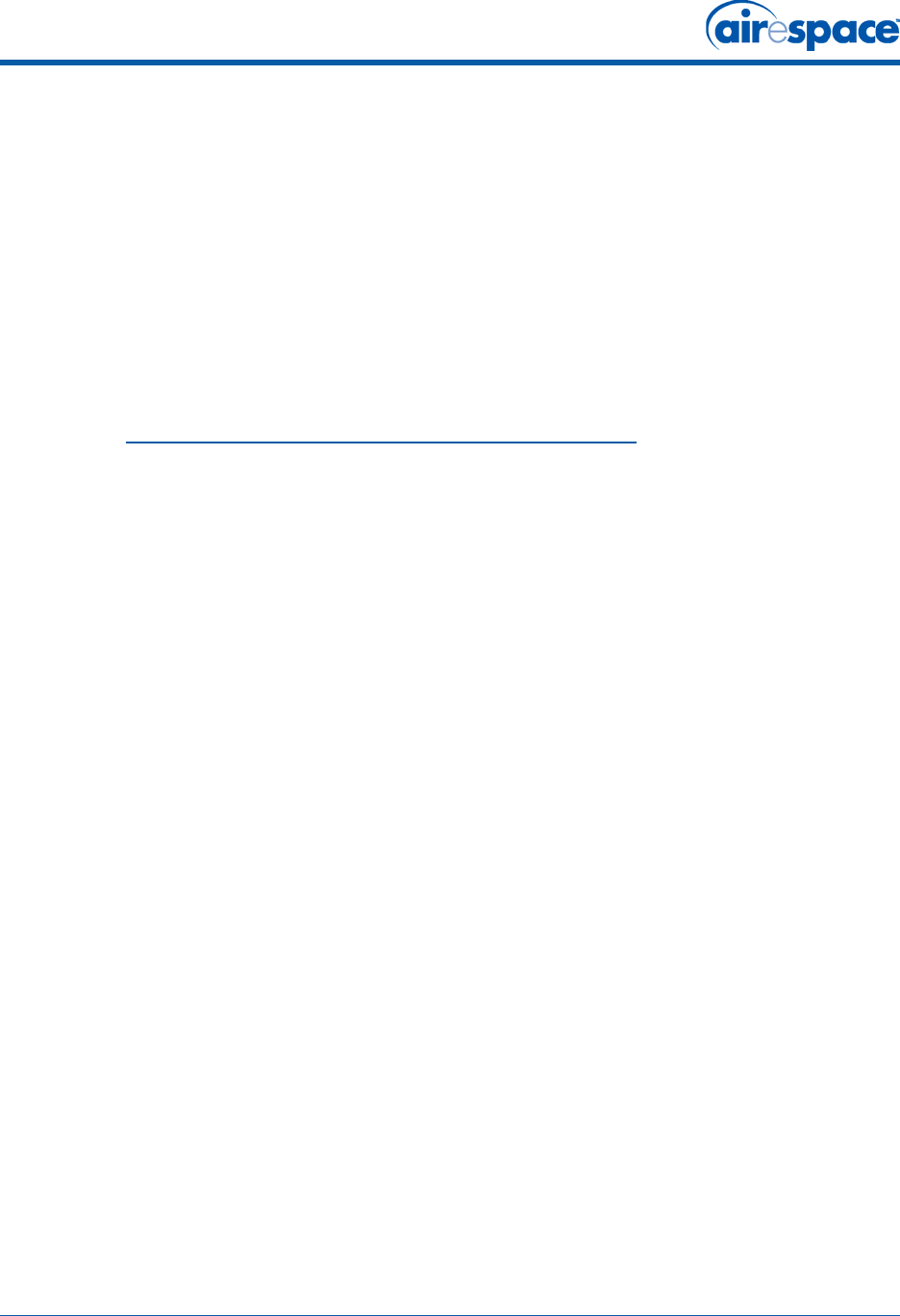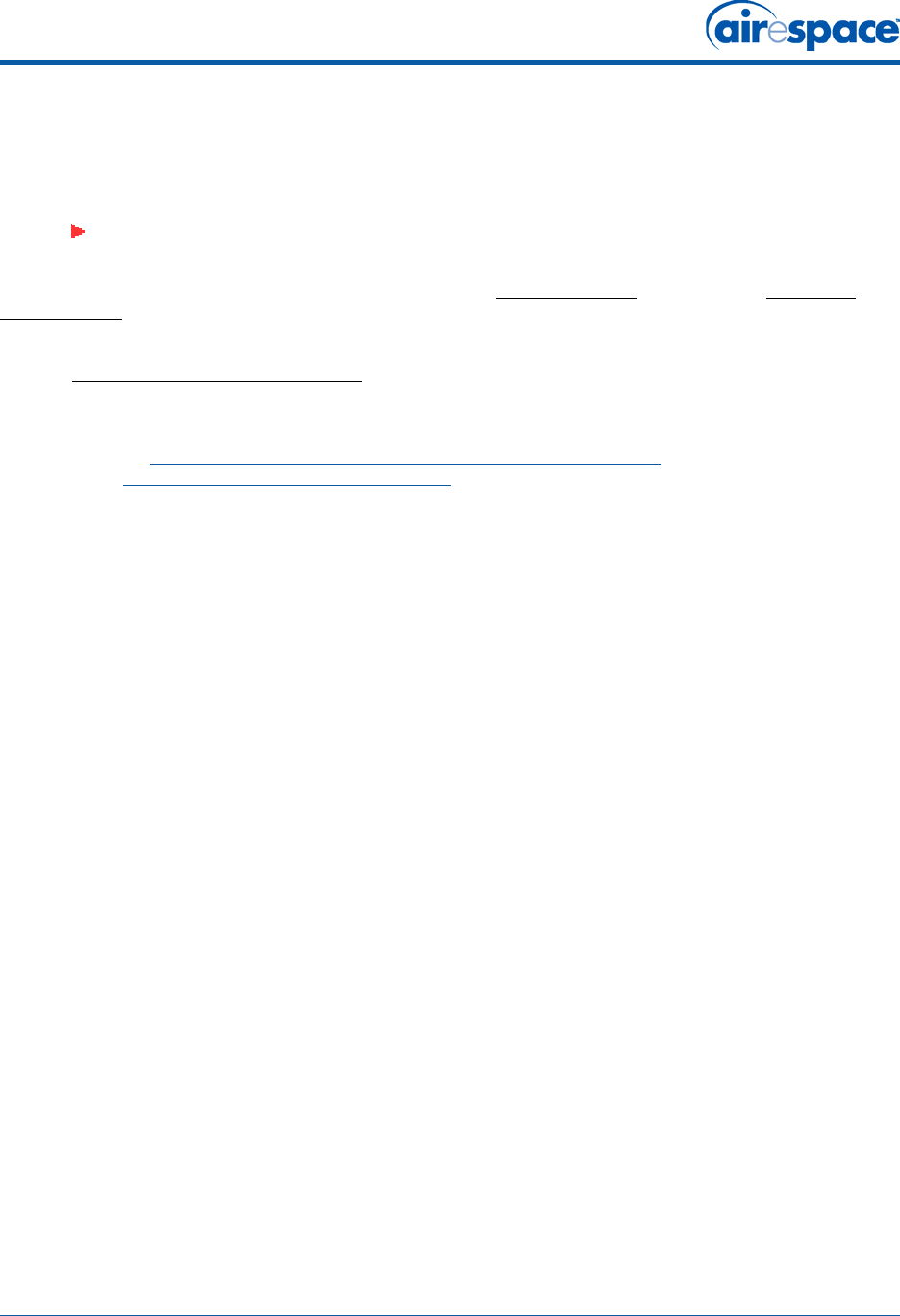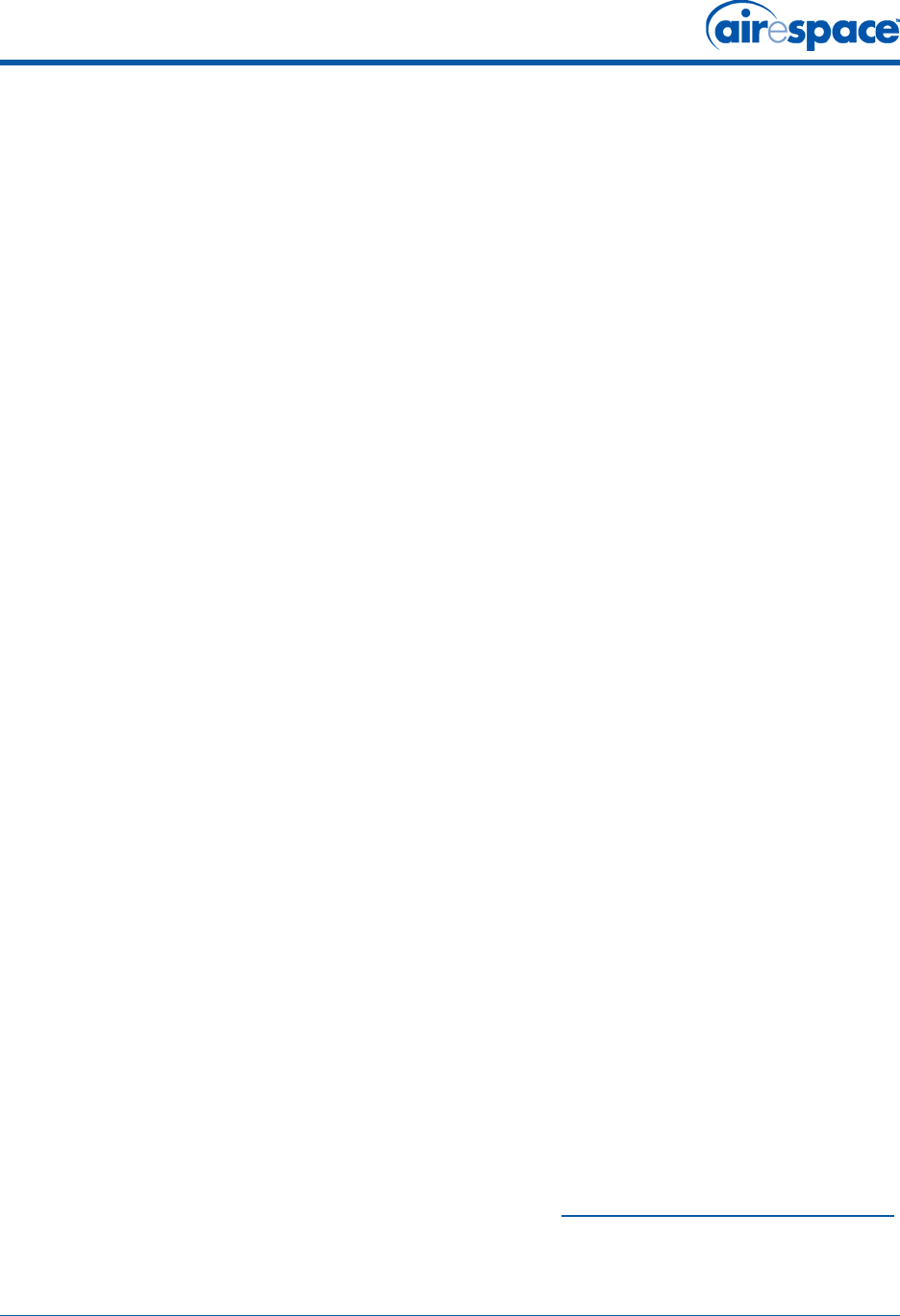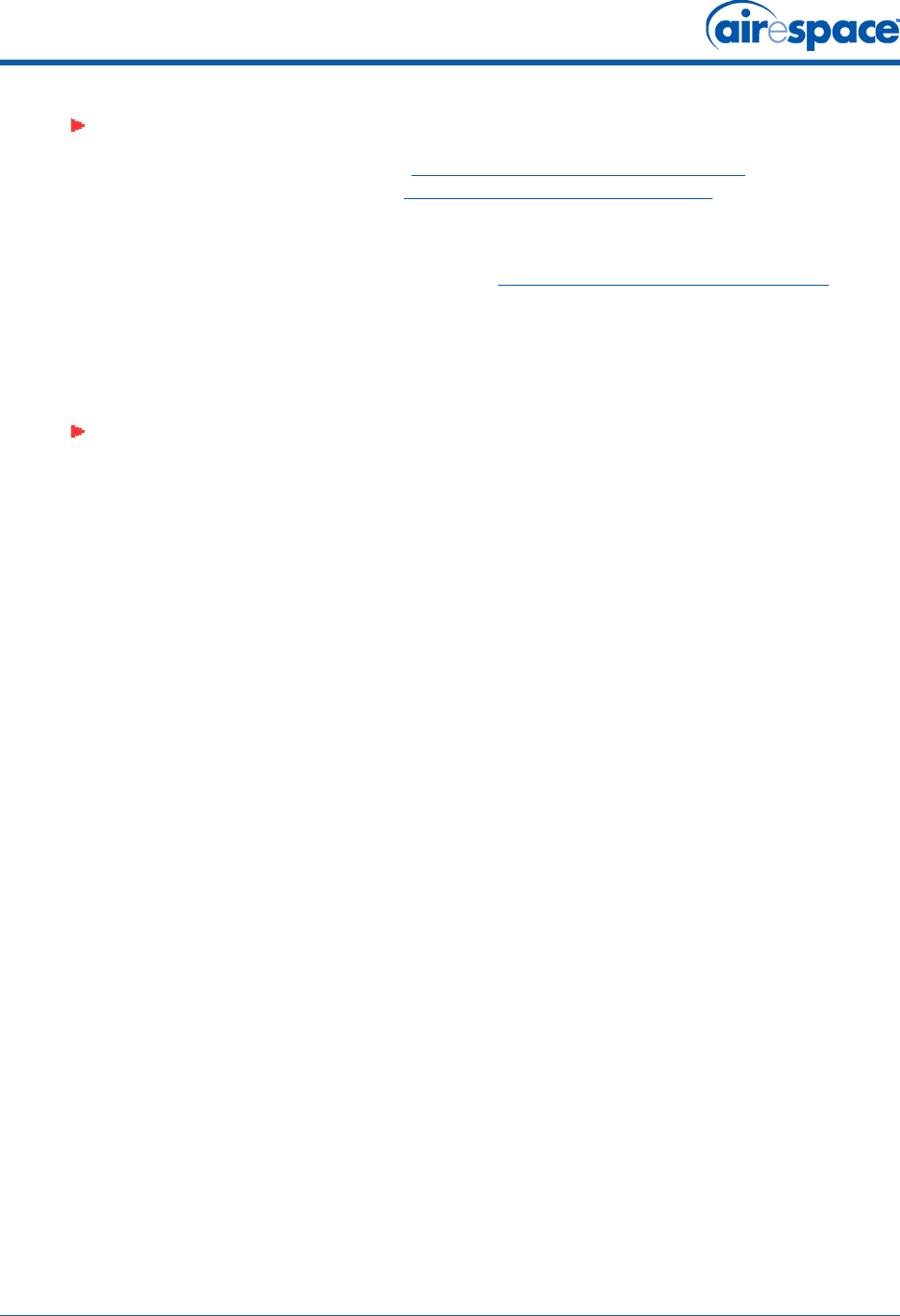Airespace 1300 Outdoor Access Point User Manual AP 1300 QIG
Airespace Outdoor Access Point AP 1300 QIG
Users Manual Revised

3/24/05 © 2005 All Rights Reserved.
90-100XXX-001
Airespace 1300 Outdoor Wireless Routing Access Point
Quick Installation GuideAirespace 1300 Outdoor Wireless Routing Access Point Quick Installation Guide
System Release 3.0
This Guide contains information about installing an Airespace 1300 Outdoor Wireless Routing Access
Point (Airespace 1300, or WRAP). This model is designed to be installed outside of a building. It
includes connectors for external 802.11a and 802.11b/g antennas.
•Overview
•Step 1: Collecting Required Tools and Supplies
•Step 2: Configuring the Airespace 1300 Before Installation
•Step 3: Preparing Mounting Locations
•Step 4: Mounting the Airespace 1300s
•Step 5: Returning MAC Information
•Planning Notes
•FCC Statements for Airespace APs
•Industry Canada Required User Information for Airespace APs
•Safety Considerations
•Airespace Global Services & Support
ATTENTION!Special Considerations
While Airespace 1300s have been engineered for easy installation, there are some guidelines that are
very important to the end users:
•Do not mount Airespace AP antennas within 1 meter (3 ft) of any metal obstructions. The RF
waves from the Airespace 1300s are blocked and/or reflected by metal objects, such as metal
HVAC ducts, conduit, pipes, elevator shafts, stairwells, and metal walls.
•Do not mount Airespace 1300s inside buildings.

3/24/05 Overview
90-100xxx-001 2
OverviewOverview
This guide is designed to provide you with the information needed to mount Airespace 1300s. Airespace
1300s are part of the Airespace Wireless Enterprise Platform (Airespace System), and require no
manual configuration after they are mounted.
The Airespace 1300 is built for outdoor applications with amplifiers that can be tuned, based on the
country of use. It provides two N-connectors for external antennas, one for 2.4 GHz, and one for
5 GHz. It also has two milspec connectors, one for a direct AC power input, and the second for a
power-over-Ethernet (PoE) input using DC power.
The Airespace 1300 has support for wireless access with integrated wireless backhaul as follows:
•Supports point-to-multipoint applications.
•Supports bridging of wired networks over a wireless backhaul.
•Supports wireless access with integrated wireless backhaul applications.
•Backhaul links are encrypted using AeS.
This document assumes that Airespace 1300 locations and mounting options have been selected, and
that you have one Airespace 1300 per indicated location.
You should have a map indicating the following:
•Airespace 1300 locations.
•Airespace 1300 mounting options.
•Airespace 1300 power options: power supplied by Power over Ethernet (PoE) from a network
device or a PoE injector/hub (usually located in a wiring closet) through the DC power supply
connector.
If you do not have a map, make one so you can record the MAC addresses from each location and
return them to the person who is planning or managing this wireless network.
Refer to the following sections to install the Airespace 1300s.
For more details about Airespace 1300 installations, refer to the Planning Notes section at the end of
this document.
Note: When mounting Airespace APs, make sure to maintain a 20 cm (8 in.) separa-
tion between the Airespace 1300 antennas and bystanders to comply with FCC RF
exposure regulations. Refer to the FCC Statements for Airespace APs section for
more information.

3/24/05 Step 1: Collecting Required Tools and Supplies
90-100xxx-001 3
Step 1: Collecting Required Tools and SuppliesStep 1: Collecting Required Tools and Supplies
•One Airespace 1300 per location.
•Airespace AP Mounting Bracket, factory-supplied with each Airespace 1300.
•Optional Airespace 1300 Pole Mounting Kits, factory-orderable.
•External 802.11a and/or 802.11b/g antennas.
•Map showing Airespace 1300 locations, mounting options, and power options.
•Screwdrivers, drills, and ladder.
•An assortment of metal screws and bolts.
•CAT-5 (or higher) cables to connect the Airespace 1300 locations and the Airespace WLAN
Controller or other network device.
Continue with Step 2: Configuring the Airespace 1300 Before Installation.

3/24/05 Step 2: Configuring the Airespace 1300 Before Installation
90-100xxx-001 4
Step 2: Configuring the Airespace 1300 Before InstallationStep 2: Configuring the Airespace 1300 Before Installation
The following procedures are designed to make sure that your Airespace 1300 physical installation goes
smoothly and that initial operation is as expected. If you are unable to prepare your Airespace 1300 for
deployment, this step also describes RMA (Return Material Authorization) procedures.
If you are unable to perform this procedure, refer to the RMA Procedures section in the Airespace
Product Guide.
Use the AP Configuration Tool User Guide to configure the Airespace 1300 before installation.
(This section To Be Determined.)
After completing Step 2: Configuring the Airespace 1300 Before Installation for all Airespace 1300s,
continue with Step 3: Preparing Mounting Locations.
Note: Perform the following procedure on each Airespace 1300 BEFORE deploying
the it in its final location.

3/24/05 Step 3: Preparing Mounting Locations
90-100xxx-001 5
Step 3: Preparing Mounting LocationsStep 3: Preparing Mounting Locations
On your map, you should have the Airespace 1300 locations, mounting options, and power options.
•Find the required mounting locations.
•Use the ceiling/wall-mount base to mark the wall or ceiling locations for sheet metal, drywall, or
other screws. Make sure you leave enough space around the Airespace 1300 and base to plug
the CAT-5 cable, optional external antenna cable(s), optional power supply cable.
Figure - Factory-Supplied Mounting Options
Figure - Factory-Orderable Pole Mounting Bracket
•Route the CAT-5, power supply, external antenna cable(s) to where they can plug into the
Airespace 1300. Make sure to leave about 6 inches (15 cm) of slack in the cables for future
modifications.
•Attach the brackets to the wall or ceiling, or install screws for ceiling-mount base:
-Where you are going to use the bracket, use customer-supplied sheet metal, drywall, or
other screws to attach the bracket to the ceiling or wall.
-Where you are going to use the ceiling/wall-mount base, install customer-supplied
sheet metal, drywall, or other screws.
You are now ready to install the Airespace 1300s. Continue with Step 4: Mounting the Airespace 1300s.
TBD
TBD

3/24/05 Step 4: Mounting the Airespace 1300s
90-100xxx-001 6
Step 4: Mounting the Airespace 1300sStep 4: Mounting the Airespace 1300s
Using the supplied or optional Airespace 1300 External Pole Mount kit, mount each Airespace AP in its
indicated location, oriented as shown on the map. Ceiling-Mount Bezel
The Airespace APs can be mounted in one of the following configurations:
•Ceiling/Wall-Mount Base -- Refer to Ceiling/Wall Mount Base.
•Pole Mount Bracket-- Refer to Pole Mount Bracket.
•Exterior Antenna Mount -- Refer to Exterior Antenna Mount.
Ceiling/Wall Mount BaseCeiling/Wall Mount Base
This section TBD
Figure - Assembling the Airespace AP and Ceiling/Wall-Mount Base
•Copy the MAC address(es) from the label(s) on the Airespace AP onto the corresponding
location on the map. MAC addresses have the format 000B85xxxxxx.
•Attach the ceiling-mount base to the bottom of the Airespace AP using the factory-supplied
machine screws and washers.
•Position the ceiling/wall-mount base so its keyhole slots are partly on the drywall, sheet metal,
or other screw heads installed in Step 3: Preparing Mounting Locations.
•Attach the cables to the sides of the Airespace AP.
•Slide the ceiling-mount base onto the drywall, sheet metal, or other screw heads until it snugs
into place.
You have installed the Airespace AP. Repeat Step 4: Mounting the Airespace 1300s for each Airespace
AP location, and then continue with Step 5: Returning MAC Information.
Note: If the screws do not securely hold the ceiling-mount base, remove the
Airespace AP and adjust the screws until they hold the ceiling-mount base securely.
TBD

3/24/05 Pole Mount Bracket
90-100xxx-001 7
Pole Mount BracketPole Mount Bracket
TBD
Exterior Antenna MountingExterior Antenna Mount
TBD.
Figure - Assembling the Mounting Screws and Spring Washers to the Airespace AP
•Copy the MAC address(es) from the label(s) on the Airespace AP onto the corresponding
location on the map. MAC addresses have the format 000B85xxxxxx.
•Slide the screws into the keyhole slots on the mounting bracket as shown in the following
figure.
Figure - Assembling the Exterior Antrenna Mount to the Airespace AP
•Attach the cables to the Airespace 1300.
Note: If the screws do not securely hold the bracket, remove the Airespace AP and
adjust the screws until they securely hold the bracket.
TBD
TBD

3/24/05 Step 5: Returning MAC Information
90-100xxx-001 8
You have installed the Airespace 1300. Repeat Step 4: Mounting the Airespace 1300s for each
Airespace AP location, and then continue with Step 5: Returning MAC Information.
Step 5: Returning MAC InformationStep 5: Returning MAC Information
When you have completed the installations as outlined in Step 4: Mounting the Airespace 1300s, return
the MAC addresses and their locations on the maps to the network planner or manager. The Airespace
Control System Software (ACS Software) operators will use the MAC address and location information
to create maps for Airespace Operating System management.
Also return any unused mounting kit hardware and external power supplies to the network planner or
manager for use in future deployments.
Note: Make sure the cables are routed away from the Airespace 1300 antennas.
Note: Please remind the Network Planner or Manager that now is a good time to
register the Airespace 1300s.

3/24/05 Planning Notes
90-100xxx-001 9
Planning NotesPlanning Notes
•About Cables
•About External Antennas
•About Mounting Options
•Planning Notes
•FCC Statements for Airespace APs
•Safety Considerations
About CablesAbout Cables
•You will run one CAT-5 Ethernet cable from the Airespace 1300 to the Airespace WLAN
Controller, another network device, or a PoE injector/hub.
•When you are powering the Airespace 1300 from AC power, route the power supply cable from
the AC electrical outlet to the Airespace 1300. Make sure you secure the AC power plug so it will
be difficult for people to pull on the power cord or unplug the power supply from the AC power
outlet.
•When you are powering the Airespace 1300 from a PoE source (Airespace WLAN Controller,
another network device, or a PoE injector/hub), you do not need to route a separate power
cable to the Airespace 1300, because the Airespace AP will receive its power across the CAT-5
Ethernet cable.
About External AntennasAbout External Antennas
•Refer to the Airespace AP External and Internal Antennas section in the Airespace Product
Guide for an overview of the external 802.11a and 802.11b/g external antennas usable with
the Airespace 1300s.
•When you are attaching external antennas to the AS-1300-EXT Airespace 1300, use cables with
N-type connectors to connect antennas to the ports on the end of the Airespace 1300. Refer to
the following figure for antenna port markings.
Figure - Airespace AP External Antenna Port Markings
TBD

3/24/05 FCC Statements for Airespace APs
90-100xxx-001 10
About Mounting OptionsAbout Mounting Options
•When you are mounting the Airespace AP on a pole, use the optional pole-mount bracket. Use
the bracket to mark the screw locations.
FCC Statements for Airespace APsFCC Statements for Airespace APs
This section includes the following FCC statements for the Airespace AP:
•Class A Statement
•RF Energy Exposure Warning
•Non-Modification Statement
•Deployment Statement
Class A StatementClass A Statement
This equipment has been tested and found to comply with the limits for a Class A digital device,
pursuant to Part 15 of the FCC Rules. These limits are designed to provide reasonable protection
against harmful interference when the equipment is operated in a commercial environment. This
equipment generates, uses, and can radiate radio frequency energy and, if not installed and used in
accordance with the instruction manual, may cause harmful interference to radio communications.
Operation of this equipment in a residential area is likely to cause harmful interference in which case
the user will be required to correct the interference at his own expense.
RF Energy Exposure WarningRF Energy Exposure Warning
This radio transmits a high level of RF energy. FCC safety regulations require that personnel working in
close proximity to the radio (within 20 cm) should take precautions to minimize their exposure to the
RF energy. This can be accomplished by:
•Remaining within 20 cm of the antennas only for short periods of time.
•Remaining further than 20 cm away from the unit whenever possible.
•Turning the radio off if it is necessary to be with 20 cm of the radio for a prolonged period of
time.
•This radio must only be installed in a location that will ensure that a separation distance of
20 cm between the radio and the general public is maintained at all times.
Installers of the radio and end users of the Airespace Wireless Enterprise Platform must adhere to the
installation instructions provided in this manual.
Non-Modification StatementNon-Modification Statement
Use only the supplied internal antenna, or external antennas supplied by the manufacturer. Unautho-
rized antennas, modifications, or attachments could damage the badge and could violate FCC
regulations and void the user’s authority to operate the equipment.
Deployment StatementDeployment Statement
This product is certified for outdoor deployment only.
EU Regulatory InformationEU Regulatory Information
Compliance Information for Model 1300 Airespace Access Points:
1. Standards met:
-Radio: EN 301 328, EN 301 893

3/24/05 Industry Canada Required User Information for Airespace APs
90-100xxx-001 11
-EMC: EN 301489-1, EN 301 489-17
-Safety: EN 60950
-RF Safety: EN 50371
2. CE Marking: Model 1300 Airespace APs are identified with the following CE marker:
3. EU Country Restriction:
Generally, the 5150-5350 MHz, 5470-5750 MHz, and 2400-2483.5 MHz bands are allowed in most EU
countries. However, there are several country specific restrictions that apply to different bands on a
country-by-country basis.
The following entries specify countries with specific restrictions:
•Austria - Only transmission within the frequency band 5150-5250 MHz is allowed. The band
5470-5750 MHz is not allowed.
•Belgium - The frequency band 5470-5750 MHz is not allowed.
•France - The frequency band 5470-5750 MHz is not allowed.
•Portugal - Integral antenna is required.
•Switzerland - The frequency band 5470-5750 MHz is not allowed.
•Czech - The frequency band 5470-5750 MHz is not allowed.
•Slovak Republic - The frequency band 5470-5750 MHz is not allowed.
Industry Canada Required User Information for Airespace APsIndustry Canada Required User Information for Airespace APs
This device has been designed to operate with antennae having maximum gains of 8.0 dBi Omni for
2.4 GHz and 9.0 dBi Omni for 5 GHz.
Antennae having higher gains is strictly prohibited per regulations of Industry Canada. The required
antenna impedance is 50 ohms.
To reduce potential radio interference to other users, the antenna type and its gain should be so chosen
that the equivalent isotropically radiated power (EIRP) is not more than that required for successful
communication.
Safety ConsiderationsSafety Considerations
•The Airespace 1300s with or without external antenna ports are only intended for installation in
Environment A as defined in IEEE 802.3af. All interconnected equipment must be contained
within the same building including the interconnected equipment's associated LAN connections.
•MAKE SURE that Airespace 1300s powered using Power over Ethernet (PoE) comply with safety
regulations.
Note: The Model 1300 Airespace Access Point is intended for outdoor use only.
The Model 1300 Airespace Access Point meets EU DFS requirement.
Note: These restrictions may evolve. It is recommended that you check with their
local authorities for latest requirements.

3/24/05 Airespace Global Services & Support
90-100xxx-001 12
•Suitable for use in environmental air space in accordance with Section 300.22.C of the National
Electrical Code, and Sections 2-128, 12-010(3) and 12-100 of the Canadian Electrical Code,
Part 1, C22.1.
Contacting Airespace Global Services & SupportAirespace Global Services & Support
Airespace provides technical support to all Airespace customers during the Hardware Warranty period,
and at all times to its Authorized Service Partners and end-users that have purchased direct Airespace
Service Contracts. If you purchased your Airespace products from an Authorized Airespace Business
Partner, you should contact that partner for your technical support requirements. If you are an Autho-
rized Service Partner or hold a direct Airespace Service Contract, please contact the Airespace Technical
Assistance Center at:
•North America: (866) 546-2100
•International: +1 (408) 635-2400
Warranty Services provided include:
•Telephone Technical Support (8 a.m.-6 p.m. / Mon-Fri / USA Pacific Standard Time)
•Hardware Replacement Services (15-day Return-To-Factory)
•Installation and Configuration Assistance (8 a.m.-6 p.m. / Mon-Fri / USA Pacific Standard Time)
Services provided to Authorized Service Partners and Service-Contracted Customers:
•24x7 Telephone Technical Support with Priority Queuing
•Next-Day Advance Replacement Hardware Services
•Software Update Services (Major, Minor, and Maintenance Releases)
•Web Support:
-Online Case Management
-Support Activity Reporting
-Solutions KnowledgeBase
-Tech Tips, FAQs, Configuration Guidelines
-Online access to Software Upgrades & Product Documentation
For information on Airespace Service Programs and Pricing, please contact your local Airespace Account
Manager or Authorized Business Partner.